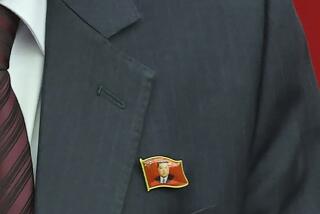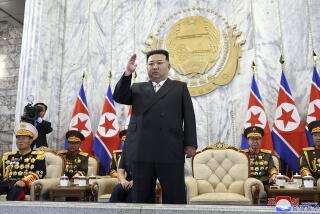China praises Kim Jong Il despite sometimes strained ties
- Share via
Reporting from Beijing — For the Chinese government, a dead Kim Jong Il is a popular Kim Jong Il.
In life, the North Korea leader was a constant irritant to Beijing with his dangerous nuclear ambitions and his stubborn refusal to reform an economy that left the population starving.
Although Chinese officials rarely criticize North Korea openly, they quietly suspended energy assistance and demanded cash in advance for sales at times when they were angry about the nuclear program. They sometimes have been stingy with food aid and have said publicly that North Korea needs to overhaul its economy.
But since Kim’s death was announced Monday, the Chinese government has practically outdone the North Korean propaganda machine in its adulation. Scholars say that approach is a reflection of the fear that North Korea could collapse and needs to be propped up.
“Kim Jong Il is immortal,” the Chinese government proclaimed on the front page of the People’s Daily on Tuesday.
“A friend’s departure,” the English-language China Daily splashed in large black letters across its front page.
Chinese Premier Wen Jiabao was photographed bowing reverently in front of a photograph of Kim at the North Korean Embassy in Beijing.
Chinese Foreign Minister Yang Jiechi telephoned his South Korean counterpart to warn Seoul against any actions or statement that would “provoke” Pyongyang during the mourning period, South Korea news reports said Thursday.
Although ideologically the Chinese Communist Party opposes hereditary succession, Beijing almost immediately endorsed Kim’s 27-year-old son, Kim Jong Un, as the next leader.
“Even in Mao’s time, such a thing couldn’t happen. It makes people think of a feudal state,” said Zhu Feng, a scholar at Peking University. Nevertheless, Zhu said, China has been reluctant to criticize at this time. “I think it is Chinese culture. If somebody is dead, whether he is good or evil, you don’t speak ill of them.”
A more practical consideration is helping the North Koreans manage the succession.
“China has decided that North Korea is too big to fail,” said John Park of Harvard University’s Belfer Center for Science and International Affairs. Park said he expects Beijing to step in with more generous offers of energy assistance, food aid and fertilizer. At the same time, the various factions of the North Korean regime are likely to be more dependent on China.
“Before, Kim Jong Il controlled all the commercial and trade relations with China. Now there will be a more collective leadership. The Chinese will play an increasingly important role,” Park said.
Another scholar, who spoke on condition of anonymity, said that since autumn, China’s Jilin province had been supplying electricity to Rason, in North Korea’s northeastern tip, where Chinese businesses are building factories and leasing ports on the Sea of Japan.
“North Korea’s economy is relying more and more on China at this very unstable time,” the scholar said.
In an often-quoted saying attributed to Mao Tse-tung, the relationship between China and North Korea once was as “close as lips and teeth.” It became strained with China’s recognition of South Korea in 1992, which North Korea considered an act of treachery.
Since Kim Jong Il fell ill in 2008, China and North Korea have drawn closer once again. In the year and a half before his death, Kim made three trips to China, it is believed, smoothing the way for the transition of power to his son.
China is increasingly exploiting North Korea’s natural resources, particularly coal and iron ore. North Korea’s exports to China in the first half of 2011 topped the $1-billion mark, triple the 2010 total. The port at Rason, in addition, gives China access to the Sea of Japan for the first time since 1860, when a key stretch of coastline was lost to Russia.
Relations between China and North Korea do not go through normal diplomatic channels, but are handled directly through their respective ruling parties, the Communist Party in China and the Workers’ Party in North Korea. The parties appear to have carefully coordinated coverage of the death announcement.
Unlike Washington and Seoul, which reportedly learned of Kim’s death when it was announced on state television, Beijing is said to have gotten the word three hours earlier, a Chinese source said.
More to Read
Sign up for Essential California
The most important California stories and recommendations in your inbox every morning.
You may occasionally receive promotional content from the Los Angeles Times.










